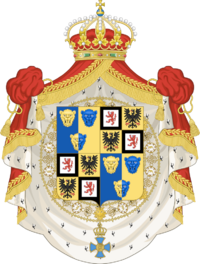Coat of arms of Durland: Difference between revisions
Jump to navigation
Jump to search
No edit summary |
No edit summary |
||
| Line 23: | Line 23: | ||
|year_adopted = 9 April 1928 | |year_adopted = 9 April 1928 | ||
|until = | |until = | ||
|crest = Crown of | |crest = Crown of Prince Jora | ||
|torse = tasseled strings Or | |torse = tasseled strings Or | ||
|shield = Per pale Azure and Or two lions rampant all counterchanged within a bordure argent. | |shield = Per pale Azure and Or two lions rampant all counterchanged within a bordure argent. | ||
| Line 30: | Line 30: | ||
|compartment = | |compartment = | ||
|motto = | |motto = | ||
|orders = Order of | |orders = Order of Prince Jora | ||
|badge = | |badge = | ||
|other_elements = | |other_elements = | ||
Revision as of 13:27, 10 January 2024
| Coat of arms of Durland | |
|---|---|
 Greater (royal) version | |
| Versions | |
 Lesser (state) version | |
| Armiger | Carilla, Queen of Durland |
| Adopted | 9 April 1928 |
| Crest | Crown of Prince Jora |
| Torse | tasseled strings Or |
| Blazon | Per pale Azure and Or two lions rampant all counterchanged within a bordure argent. |
| Orders | Order of Prince Jora |
The coat of arms of Durland is the arms of dominion of queen Carilla of Durland, and is used to represent both the monarch and the kingdom. It depicts two lions countercharged onto a vertically-divided shield of blue and gold, within a white border (Per pale Azure and Or two lions rampant all counterchanged within a bordure argent.)
The coat of arms is used by the Queen, Parliament, and the Supreme Court. Members of the Royal Family use the arms charged with a label of difference and a crown of rank. The government uses a variation of the arms, without the mantle and with the shield crowned, which is known as the state arms. The arms in banner form serves as the Queen's royal standard.